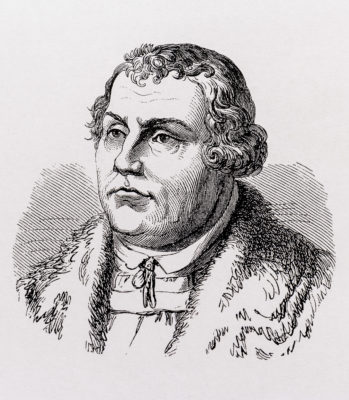|
Listen To The Article
|
God is our refuge and strength, a very present help in trouble. Therefore we will not fear. . . The Lord of hosts is with us; the God of Jacob is our fortress.
—Psalm 46:1-2, 7, 11
As soon then as he had said unto them, I am he, they went backward, and fell to the ground.
—John 18:6
A Song Of Victory
It was a gray morning in September. Fog hid the enemy, but they were there, just across the field.
The king commanded his men to kneel. The king too fell to his knees and lifted up his prayer to the Lord of hosts, the God of all battles. As he concluded, the whole army thundered back with conviction:
A mighty fortress is our God,
a bulwark never failing;
our helper he, amid the flood
of mortal ills prevailing.
When the hymn died away, the king, Gustavus Adolphus of Sweden, mounted his white charger and called out to his troops. He told them to remember that they fought for God, country, and king. And with that, the Snow King of Sweden led his men onto the field to save the German Reformation. That field was Breitenfeld, just north of Leipzig.
So tradition recalls the matter. Primary sources aren’t very reliable. But “A Mighty Fortress Is Our God” became the battle anthem for the Swedish Protestants during the remainder of the Thirty Years’ War. The truth is, it became a battle hymn for most of the Reformation churches at that time.
The History Of The Hymn
Given the importance of the hymn, it’s strange that history has forgotten the exact time and circumstances of its composition. Almost all scholars agree that Martin Luther, the firebrand of the German Reformation, wrote the words. Luther took Psalm 46 as a point of departure, but rather than paraphrase the whole psalm, he moved his hymn into the fullness of New Testament revelation with a particular emphasis on material in John’s gospel.
The music, too, was Luther’s. He had a long acquaintance with vocal and instrumental music. “Luther earned money to pay his school fees by singing in the streets of Eisenach. He played the lute, and singing always was an important part of his life.”[1] In his later years, Luther “wrote several original hymns and melodies, revised many Latin hymns to German texts set to adaptations of plainsong and folk melodies and encouraged the composition of new texts and rhythmic hymn melodies. His thirty-seven hymns are written in simple, plain, and sometimes rough phrases and striking metaphors, qualities that are mostly lost in English translations.”[2]
The exact circumstances of the hymn’s composition remain obscure, however. Yet, this hasn’t kept scholars from offering various and passionate speculations.
The Devils At Worms
Some have said Luther wrote “A Mighty Fortress” while he was on his way to stand before Emperor Charles V at the Diet of Worms in 1521. It was on that occasion that Luther wrote to his good friend Spalatin, “Were there as many devils at Worms as there are tiles on the roofs of the houses, I would go in.”[3] The third verse of “A Mighty Fortress” says something similar:
And though this world, with devils filled,
should threaten to undo us,
we will not fear, for God has willed
his truth to triumph through us.
A Mighty Fortress Goes Missing
But three years after the diet of Worms, Luther’s hymns went to print and “A Mighty Fortress” wasn’t among them. About the same time, the citizens of Magdeburg met for a marathon songfest to protest Roman Catholic rule. These faithful Lutherans sang Luther’s hymns for hours and hours, but “A Mighty Fortress” wasn’t among their choices either.
Other scholars have pointed to Luther’s debate with Ulrich Zwingli over Christ’s presence in the Supper and have connected the words “one little word will fell him” with the words of institution (“This is My body”). Notwithstanding, the line “above all earthly powers,” if not a reference to Jesus Himself, is a claim to Jesus’s divine authority. In fact, Luther may be alluding to Jesus’s arrest when His simple words, “I am he,” sent the crowd hurtling backward to the ground. Luther wrote:
Under the papacy, these words [I am he] were forgotten. . . Yet in the same way in which Christ casts to earth with a single word such a large company of the soldiers and temple servants, so his merit and suffering will drive back the merit and suffering of all humankind: so that his suffering alone grants us salvation before God.[4]
Others scholars, searching for the hymn’s origin, have suggested the Diet of Speyer in 1529 or the Diet of Augsburg in 1530, both confrontations with profound results for the Reformation. Nonetheless, the hymn was already in circulation early in 1528.[5] Still, others have looked to an outbreak of the plague in 1527 or the death of Luther’s own daughter that same year.
A Hymn Of Comfort
Whatever the specific occasion of composition, my guess is that Luther was thinking more of the personal comfort that Christians have in the Gospel than he was of the Gospel’s final victory in history.
A heading from an old broadsheet (something similar to modern sheet music) of “A Mighty Fortress” published in Augsburg in 1529 reads “A Hymn of Comfort.”[6]
And the hymn does provide great comfort, although some of this comfort seems “locked” in Luther’s original German language version. For instance, in the original, the opening line describes God not merely as a defensive fortress, but also as a weapon. “He is our helper… ‘helps us get free’… from every misery.”[7]
At the same time, Luther rejects any confidence in the flesh: “With our power, nothing is accomplished.” Only Christ is our hope. He is the Lord of hosts (Lord Sabaoth) and “there is no other God.” He is the Victor and “The kingdom must remain for us.”
If only a few letters, “I am he,” can overthrow the agents of evil that have come to capture God’s champion, how much more powerful is the Word of God in its entirety? Luther’s hymn places the appointment of the champion to combat the world and its many devils—Jesus Christ—at its heart. The final verse of the hymn is a natural development of the theme of the efficacy of both the Incarnate Word in history and also the preached Word in its contemporary setting.[8]
Conclusion
“A Mighty Fortress” became the battle hymn of the Reformation precisely because it spoke the comfort of the gospel to the human soul. It promised victory, not only against personal temptation but against all of the enemy’s designs. It held up Jesus Christ as the Lord of hosts. They sang the hymn…
At Augsburg during the Diet, in all the churches of Saxony, and often against the protest of the priest. They sang it in the streets; and, so doing, comforted the hearts of Melanchthon, Jonas, and Cruciger, as they entered Weimar when banished from Wittenberg in 1547. Poor Protestant emigrants sang it on their way into exile, and martyrs did so at their death. It is woven into the web of the history of the Reformation, and it became the true national hymn of Protestant Germany.[9]
Furthermore, as tradition tells us, “Gustavus Adolphus ordered it sung by his army before the battle of Leipzig in 1631… Again, it was the battle hymn of his army at Lützen, in 1632, in which the King was slain, but his army won the victory.”[10]
Indeed, “A Mighty Fortress” is a hymn of profound spiritual victory. It’s also a hymn of comprehensive cultural triumph which emphasizes the implications of Christ’s reign. My own opinion is that “A Mighty Fortress” is one of the greatest hymns ever written. If you like it…
Please check out our new audio adventure, St. Bartholomew’s Eve, where “A Mighty Fortress” makes a starring role.
Footnotes
[1] Diane Severance, “A Mighty Fortress Is Our God,” Christianity.com, April 28, 2010, https://www.christianity.com/church/church-history/timeline/1501-1600/a-mighty-fortress-is-our-god-11629923.html[2] Carlton R. Young, United Methodist Hymnal editor, quoted in C. Michael Hawn, “History of Hymns: ‘A Mighty Fortress is Our God,” Discipleship Ministries @ https://www.umcdiscipleship.org/resources/history-of-hymns-a-mighty-fortress-is-our-god.
[3] Louis F. Benson, Studies of Familiar Hymns (Philadelphia: Westminster Press, 1903), 156.
[4] Martin Luther quoted in Andreas Loewe and Katherine Firth, “Martin Luther’s ‘Mighty Fortress,’” Lutheran Quarterly, April 23, 2018, 136.
[5] Benson, 158.
[6] Albert B. Collver, “A Mighty Fortress,” Lutheran Reformation.org, October 1, 2015, https://lutheranreformation.org/history/a-mighty-fortress/
[7] Andreas Loewe and Katherine Firth, “Martin Luther’s ‘Mighty Fortress,’” Lutheran Quarterly, April 23, 2018, 134; see also David Mathis, “A Mighty Fortress Is Our God,” desiring God.org, October 29, 2017.
[8] Ibid., 136. [9] Benson, 159. [10] Ibid.
 Off The Grid News Better Ideas For Off The Grid Living
Off The Grid News Better Ideas For Off The Grid Living






